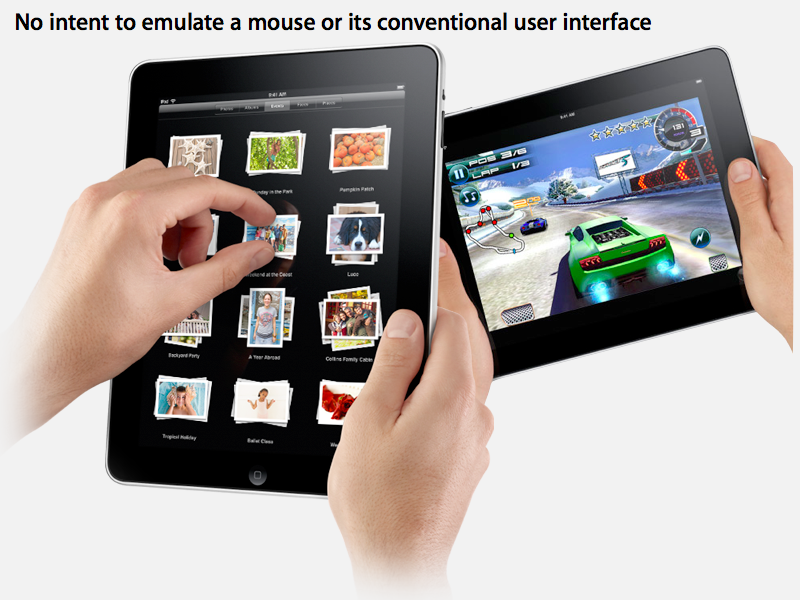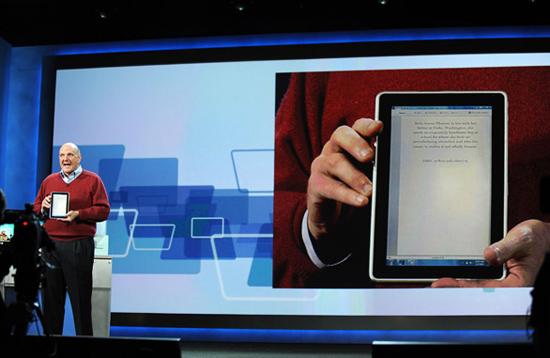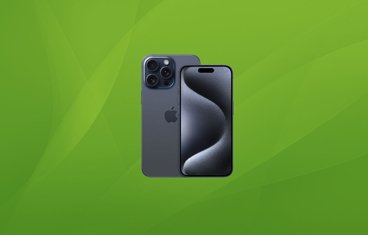Tim Cook says Windows 8-style tablet PC convergence won't please anyone
When asked by Richard Gardner of Citigroup whether Apple will eventually converge its iPad and MacBook Air products into a single computing device combining the portability of a tablet with the functionality of a keyboard and full desktop operating system, Cook dismissed the idea as poorly conceived.
"There seems to be a lot of work, particularly on PC based platforms," Gardner said, "to combine the PC and tablet experience going forward, in part because Windows 8 is a touched based operating system as well. Can you comment on why you don't believe the PC and the Ultrabook and tablet markets will converge?"
"Anything can be forced to converge," Cook answered. "But the problem is that the products are about tradeoffs. You begin to make tradeoffs to the point where what you have left at the end of the day doesn't please anyone."
Cook quipped "you can converge a toaster and a refrigerator, but you know, those things are probably not going to be pleasing to the user."
Apple's intent to create distinct products with iOS and OS X has been clearly evident since the original iPad was launched in early 2010.
While Cook noted that the two platforms have freely borrowed functionality from each other from Messages to Reminders to Game Center and the Notifications Center planned for the upcoming OS X Mountain Lion, he said the form factor of tablets and notebooks aren't destined to merge anytime soon, due to how the the two categories of products are actually used.
Apple sees huge market for tablets
Cook added, "Our view is that the tablet market is huge," noting that Apple realized this before the iPad ever went on sale, just from observing how broadly useful the tablet device was in internal testing.
"The iPad has taken off, not only in consumer [markets] in a meaningful way," Cook stated, "but in education and in enterprise, and its sort of everywhere you look now."
Additionally, "as the ecosystem gets better and better and as we double down on making great products, I think the limit here is nowhere in sight."
Cook added that in its first two years, Apple sold 67 million iPads, noting that it took 24 years to sell that many Macs, five years to sell that many iPods and three years to sell that many iPhones.
Cook: notebooks and tablets are different markets
After noting the "universal" appeal of iPad, Cook noted that market research firms from IDC to Gartner to Forrester are all predicting that tablets in general will grow to over a 300 million unit market with just three years.
Cook also stated that he also sees tremendous potential for conventional systems like the MacBook Air, noting that "we continue to innovate in that product. But I do think that it appeals to someone that has a little bit different requirements.
"You wouldn't want to put these things together because you end up compromising in both and not pleasing either user. Some people will prefer to own both, and that's great too. But to make the compromise of convergence, we're not going to that party.
"Others might, from a defensive point of view particularly," Cook said, a clear dig at Microsoft's strategy of offering one converged product line under Windows 8 while advertising that it will offer 'compromise free' computing.
"We're going to play above," Cook stated.
Windows 8 gets closer to more demos
Microsoft plans to show off a functional preview of Windows 8 in June, a year and a half after announcing its Windows-on-ARM plans to revamp the Tablet PC product that it has never succeeded in getting off the ground over the past decade of attempts.
Microsoft most recently attempted to deliver a Windows 7-based tablet under the new name "Slate PC" in a partnership with HP, just days before Apple announced the first iPad. Slate PC was quickly abandoned but Microsoft spent the rest of 2010 and 2011 talking about how the next version of Windows would eventually deliver a worthy competitor to Apple's tablet.
Microsoft has also lost its once significant share of the smartphone market with the release of Apple's iPhone, and attempted to thwart sales of the iPod with its own music player that didn't ever gain any real traction. Windows 8 hopes to pool the technologies and look and feel invested in Windows Phone and the Zune to turn the stagnant PC business around while also launching tablets it hopes will only compete with iPad and not further cannibalize the market for conventional Windows PCs.
 Daniel Eran Dilger
Daniel Eran Dilger












 Mike Wuerthele
Mike Wuerthele

 Malcolm Owen
Malcolm Owen
 Chip Loder
Chip Loder

 William Gallagher
William Gallagher
 Christine McKee
Christine McKee
 Michael Stroup
Michael Stroup







116 Comments
Windows 8 will be a gigantic disaster for Microsoft. Mark your calendars.
Windows 8 will be a gigantic disaster for Microsoft. Mark your calendars.
not really.
if things go wrong (by wrong i mean 100 million copies of it sold) they delete metro.
then?things get normal.. like they has bee for the past 10 years. if apple ever has 20% market share globally, the pc industry collapses, so it won't happen.
not this way.
Tim Cooke was quoted as saying "the Windows 8 tablet makes a great cutting board for my sushi." It is wide spread knowledge that all Billionaires use all non Apple Tablets for many types of kitchen uses from cutting melba bread to serving their west highland terriers their Cesar Milan home made dog food. I mean really what good are they for any way. Rectangular Frisbees in Frisbee golf? Here comes a Frisbee oh wait I hear a windows bootup sound. Hey he got a hole in one.
huh?
not really.
if things go wrong (by wrong i mean 100 million copies of it sold) they delete metro.
then?things get normal.. like they has bee for the past 10 years. if apple ever has 20% market share globally, the pc industry collapses, so it won't happen.
not this way.
huh?